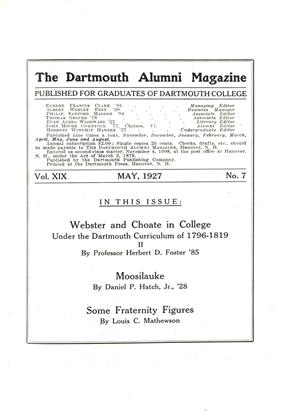(From The Yale Alumni Weekly)
The football reforms which the President of Dartmouth has recently proposed to an interested and attentive public, have in them the outstanding merit that they put the college before the stadium and the real purpose of American higher education before the demand for public college sports. As such they deserve more than passing notice and need to be given thought. Whether in their entirety they meet the whole situation, we are not so ready to say. But public acceptance of President Hopkins' proposals as they stand, is of less moment than willingness to believe that what he wants to do in proposing them is to have college sports restudied from the angle of what is best for the college itself as an educational institution, and this we believe is well worth doing.
From this point of view, the proposals for the removal of the professional-coach system, which has come to make a very considerable business of the preparation of college teams for contests with each other, for double-header football games, one at home and one abroad with the same opponent, and for the limitation of playing to the two middle classes of a college, are proposals which, if carried out, would in the long run knock out all of the "professionalism" that is in our college games. And of the older Eastern colleges, there are few that for some time have not been occupied with various plans looking toward some such end.
In company with the President of Dartmouth, what we think a number of such institutions would like to see come about is the shifting of the interest and hence the emphasis in our college sports, from the public to the Campus. This is the spirit of the English college sports, and its great merit is that it makes of athletic competition a legitimate part of the college educational system, as important to the participants and as valuable, as the classroom. This was the spirit of the older days of American college sports, before the newspaper sporting editors took charge of them. We look to see the day return, and for that reason are hospitable to any proposals that will hasten it. Such a day would see, say at Yale, a general participation in inter-class and inter-college sports within the University going on all through the year and of no interest to anybody except the participants. It would see the games generalled by the players themselves and their elected captains. It would see at the end of such an "intra-mural" season, a quickly assembled "University" team play two or three other colleges, which similar conditions existed to what we have just pictured at Yale. We do not think that this is impractical; we confidently expect some such conditions to come one of these days. Proposals such as President Hopkins makes, regardless of their details, are in line with such a situation and when enough more suggestions of the sort are made by equally responsible public leaders, something will be done about it.
 View Full Issue
View Full Issue
More From This Issue
-
 Article
ArticleWEBSTER AND CHOATE IN COLLEGE
May 1927 By Herbert Darling Foster '85 -
 Article
ArticleTHE UNDERGRADUATE CHAIR
May 1927 -
 Article
ArticleMOOSILAUKE
May 1927 By Daniel P. Hatch, Jr. '28 -
 Article
ArticleSOME FRATERNITY FIGURES
May 1927 By Louis C. Mathewson -
 Article
ArticleDARTMOUTH STUDENTS SAID TO BE IRRELIGIOUS
May 1927 -
 Class Notes
Class NotesClass of 1921
May 1927 By Herrick Brown
Article
-
 Article
ArticleDartmouth Board Elections
December, 1928 -
 Article
ArticleIllinois Honors Alumnus
NOVEMBER 1929 -
 Article
ArticleMEDICAL SCHOOL GRANT
December 1960 -
 Article
ArticleA Life Spent in the Company of Books
APRIL 1996 -
 Article
ArticleHanover Browsing
October 1951 By HERBERT F. WEST '22 -
 Article
ArticleRECOLLECTIONS OF RUFUS CHOATE
April, 1922 By Miss M. A. CRUIKSHANK


